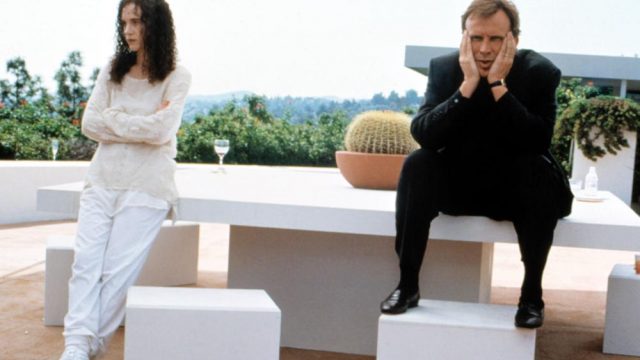There may be no better time to rediscover The New Age. It takes dead aim at the vague positivity that has infused global culture, not the least the corporate appropriation of Buddhism, aided and abetted, of course, by Hollywood. From a political viewpoint, sure, it’s a troubling development given the recent news, but one that’s long been coming. The New Age takes as ground-zero the self-absorbed LA scene in 1994, carefully observed from an insider’s perspective—as opposed to the cheaper shots delivered by Woody Allen’s NYC-based films.
Second in the implosion-drama trilogy of the first half of the 90s, The New Age is preceded by Husbands and Wives (1992) and followed by Safe (1995). While Husbands and Wives and Safe both, in key moments, use visual tropes of horror films to depict claustrophobic relationships, The New Age takes a different route: it’s all open spaces, airy architecture, and lofty angles, a postmodern emptiness that satirizes the head spaces of its characters.
The New Age also recalls a misunderstood masterpiece around a decade and a half earlier, Steely Dan, Gaucho (1980). Upon release, its airbrushed sonic perfection concealed Donald Fagen and Walter Becker’s brutal satire of hedonistic losers. What surely didn’t help the album’s reception was the stressful conditions of its making, Fagen and Becker dancing close to the edge of their own excessive lifestyles. Having lost interest by the time they finally finished the project, they were typically dismissive. Becker deadpanned that it had some interesting vocal harmonies. Now Gaucho tops the list of their best records.
Upon reexamination, The New Age has aged rather well. Written and directed by Michael Tolkin, the film has a script, filled with barbed one-liners, that could almost stand on its own. Judy Davis and Peter Weller get how its cadences provide telling details that arise from the surface blankness. Having a knack for playing unlikeable characters, such as in Husbands and Wives, Davis lets these characters have a window into their unhappiness, opened by the release of repressed anger. When Davis raises her voice, she commands our rapt attention. On the other hand, when Weller raises his voice, he sounds whiny. Together they have a fascinating anti-chemistry as the blandly attractive Peter and Katherine Witner, whose marriage, overall, seems more like a convenient business arrangement than an emotional commitment.
What they both do feel, above all else, is dissatisfaction. They’re both floundering in their respective jobs, with no way “to visualize what they want,” as Peter puts it, taking the lead on these matters as he is wont to do. As they decide to open a high-end fashion boutique, blithely paying no attention to the three rules of real estate—location, location, location—they sublimate their fears of failure in New Age philosophy led by gurus who have cultivated a loyal and dedicated following. Whatever reservations they have, they are eager to buy what the gurus are selling.
Which is a whole lot of head games. Here Tolkin revels in letting New Age spirituality condemn itself. One of the gurus transforms the open-ended riddles of Eastern philosophy (designed to foster self-reflection) into high-concept banality: “Leave my answer open, but you should go to the end of your question.”
But neither Peter nor Katherine can fully let go, which makes their outcome different from the fate of the female protagonist in Safe: her soul becomes part of her suburban-bunker mentality, and we’re there for each horrifying step of the way (although the ending does register as a kind of satire of New Age self-healing). From this perspective, The New Age is more like Husbands and Wives, kind to be cruel in granting a few moments of insight to its characters that are invariably fumbled away.
In an incisively staged dual scene, Peter and Katherine both seek a release. Peter accepts the invitation of one of the women he’s been chasing to attend, as she, with a disarming lack of passion, puts it, a party with “the usual art and spirituality and S&M crowd.” When he arrives, he is completely out of his element, setting up by far the funniest part in the film that is crystallized by the desperation in his claim, “I can play this game.” While, in an inspired soundtrack choice, “Slide Away” (1993) by the Verve blasts away in the background—the massive guitar riff further highlighting the mix of sexual tension and anomie—Peter’s awkward retreat indicates he’ll always be too repressed to be able to hang with what he thinks is the cool crowd (although there are plenty of people who will profit of him by making him believe that he can).
Katherine attends a healing ritual. But she comes to her senses and shouts, “I don’t feel anything!” She has tired of the lightweight emotional workout, and gets as close as she’s ever been to feeling angry, the very emotion that New Age philosophy regards as unhealthy. She is finally sent close to the edge, yet not over, when she spies Peter putting the moves on another woman at the retreat, which is where he ended up after the debacle of the party.
In a scene striking for its lack of dialogue–Davis doing all her acting with facial expressions and physical gestures–what she knows now is to break up with Peter. She then devises a wonderfully twisted scheme, that one-ups the icy theatrics of their previous battles, proving that divorce is a dish best served cold. That’s all she gets however, and the film does little to suggest any other significance of this life change.
During a conversation about Husbands and Wives, Wallflower commented that “sometimes the worst fate is never to be punished for what you’ve done, never to learn, never to change.” Following this logic, Peter and Katherine get what they truly deserve. If they fall, they fall upwards.


